- Home
- Karen Hawkins
A Cup of Silver Linings Page 3
A Cup of Silver Linings Read online
Page 3
She was glad her connection with plants was useful, something bigger than merely making everyone’s yards look like exotic gardens. Years ago, when Ava had just turned sixteen and was already landscaping her neighbors’ yards for extra money, eleven-year-old Sarah had knocked on Ava’s door in the middle of the night, saying she couldn’t sleep because there was a book in the attic calling Ava’s name. Clutching a cheap flashlight that only put out a dim, yellowish beam, they’d climbed the rickety stairs into the dark, dusty attic, past broken lamps, musty boxes of ancient pictures, forgotten Christmas decorations, and incomplete sets of old china to a large trunk that sat at the very back. They’d had to fight the rusted latch but finally managed to coax it open.
Sarah had pushed aside a mound of tattered velvet curtains and produced an old journal labeled TEAS AND ELIXIRS. She’d shushed the book and then held it toward Ava. “This is yours.”
Smelling faintly of old vanilla, mint, and other herbs Ava didn’t recognize, the notebook had been the property of their great-great-great-aunt Mildred Dove, a known hermit who had written up scores of herbal tea recipes and scribbled copious notes in the margins using such ill-spelled phrases as “Efecctive digestivo” and “Harvest during summer soltise or no gud.” The notes rather than the recipes had intrigued Ava, who had studied the book relentlessly. One day, after hearing Momma murmur yet again how tired she was, Ava decided to make a tea Aunt Mildred had claimed “helped ease the tired.”
It had taken Ava three days to concoct the brew. She’d prepared the herbs and plants, meticulously following the recipe and notes to create a delicate tea made from magnolia bark, dried ginger and cloves, and two dandelion petals she’d placed on a china plate and left out for one full night under a half-moon. To Ava’s surprise, the plants had joined in, ideas of their usefulness flickering through her mind every time she’d touched a leaf or a flower.
No one had been happier than Ava when, after drinking a cup, Momma had slept better than she had in a long time.
Making that first tea—and seeing it work—had lit a fire in Ava’s youthful heart. She could do more than tend yards; she could help others. All she had to do was listen to the plants and follow Aunt Mildred’s recipes and notes. At first, Ava just made her teas for people she knew. But as time passed, just as with her landscaping business, more and more people came to Ava, asking for her help. Soon, she was making a brew for just about every family in town.
Ava stashed the watering can back in its place behind the bar, her gaze falling on her colorful planner, a gift from Julie. It looked as if it belonged to a sixteen-year-old, not a successful businesswoman, and even came with smiley stickers, which had particularly thrilled Julie.
Ava put her hand flat on the planner, the plastic cover cool under her palm, and wished yet again that she’d gotten to know Julie sooner. During those last few weeks, Ava had admitted as much to Julie, who’d merely shrugged and said she wasn’t an easy woman to get to know. That was true; Julie’s moods were swift and unfathomable. Ava had found out almost too late that her new friend had been so, so worth the effort.
With a heavy sigh, Ava turned away and picked up a blue tarp. She’d just unfolded it when someone rapped on the door.
Who on earth would knock? She never locked it. Stifling her irritation, she called out, “It’s open!”
Ellen Foster breezed in, carrying a large, bulky package wrapped in brown paper.
Ava suddenly remembered that Ellen had mentioned at the funeral that she might stop by this morning. I forgot, darn it. Ava forced a smile. “Good morning.”
“Good morning.” Dressed in a pair of cream slacks and a flowy gray cashmere top under a navy wool coat, her paleness offset with deftly applied makeup, Ellen looked as if she should be on her way to a posh lunch in Manhattan rather than an unfinished tearoom. Ava was instantly aware of her own scrubbed face, ponytail, paint-stained coveralls, and work boots.
“This is yours.” Ellen placed the package on the bar and then removed her coat and hung it over her arm, her gaze sweeping past Ava. “So this is the tearoom Kristen keeps talking about.” Ellen walked slowly around the room, her gaze lingering on the unfinished walls and discolored wood floor. She paused to point to the floor. “Original wide-cut planks. That’s fortunate.”
“They need some work. I was thinking of whitewashing the floor and stenciling it with the names of the teas.”
“I wouldn’t. Even with a high-gloss polyurethane, your baristas will spend all their time trying to keep it clean. I’d stain it a deep color, something to complement the brick.”
Ava sighed. Dylan had said the same thing. “You’re probably right. I love whitewashed wood, but I guess it’s not practical for a floor.”
“If you ask me, that is where you should put whitewashed wood.” Ellen nodded to the wall behind the bar. “I’d use reclaimed barn wood, as it has an interesting texture. A lighter stain would make the bar more of a focal point too.”
That was a good idea. A really good one. “I could stencil the types of teas there.”
“You could. It would make a nice contrast, especially if you put shelves here and there stained to match this dark mahogany.” Ellen ran her pale hand along the bar. “A beautiful piece. Edwardian, I would think?”
“That’s what I was told.” Ava folded the tarp, placed it back on the floor, and went to join Ellen. “I’m going to follow your advice about the wall. That would be lovely.”
Ellen’s expression softened, a faint smile touching her mouth. “I’ve overseen a number of renovations of older buildings much like this one. My firm has a crack team of designers and over the years, I’ve learned a few things from them.”
“A lot of things, from the sound of it.” Ava pulled the package closer. Across the paper, scrawled in Julie’s familiar loopy handwriting, were the words “The Ripening, for Ava Dove’s new tearoom. Good luck!”
Ava’s chest tightened. Oh, Julie. Thank you.
When Ellen and her daughter, Julie, had lived in Dove Pond years ago, Ava hadn’t known either of them well. Ellen tended to keep to herself, and Julie—though friendly—was much older than Ava. They’d gone to different churches, too. Eventually, Ellen and Julie had moved away, and Ava had rarely thought about them until Julie returned ten years ago, this time with her six-year-old daughter, Kristen.
At first, no one knew how to take Julie, who was so moody, she seemed like two people in one. Most days, she’d breeze into town and talk everyone’s ear off, but those were followed by days or even weeks when she’d hunker down in her house, only coming to town when necessary, scowling and muttering to herself while refusing to speak to anyone else. Later on, when Kristen was older, it wasn’t unusual to see the young girl running the household errands whenever her mother was in one of her “solitary moods,” as they came to be known.
Ava now knew that Julie had bipolar II or, as she called it, “bipolar lite.” When Ava had begun visiting Julie during her last months, Julie had opened up about her condition, describing herself as a “too” sort of person—too loud, too assertive, too happy, too much. But then, at other times, her mood was too heavy to hold, like an overfilled sponge.
Not that it mattered. Over the years, the people of Dove Pond had accepted Julie as one of their own, enjoying her brighter days and leaving her alone when she wished it. They admired her art, too. Almost everyone had a few paintings they’d purchased from her earlier days when she used to have a booth at the summer farmer’s market. And everyone had been sad when she’d started to lose her battle with breast cancer. Worried, Ava had asked Kristen if there was anything she could do, and Kristen had reluctantly admitted that her mom was having trouble sleeping because of the pain.
At the time, Ava didn’t know Julie well, but one look at the older woman’s face and it was obvious that there was more to her sleeplessness than pain. The truth was, Julie was afraid of going to sleep, worrying each time that she might not wake up, and she was desperate to prolong
her time with Kristen.
It had taken Ava four days to make the tea, and when she’d returned, she’d brought a canister with a label that read FOR JULIE FOSTER TO ADD ENERGY AND EASE. STEEP FOR FIVE MINUTES IN BOILING WATER. ADD SUGAR. AND PLEASE, EAT MORE CHOCOLATE.
The tea had allowed Julie to sleep because it had eased her anxiety so that she could savor her remaining days with her daughter. Kristen had been grateful, but it had been the relief in Julie’s face that had made Ava return every day after that. She’d said she was coming to monitor the tea’s effectiveness, but the reality was much simpler. If there was one thing Ava had learned from her connection with plants, it was that life’s ebb wasn’t always as peaceful as one might hope. Like some plants, some people fought to stay alive with every atom of their being. Julie was dying, but she couldn’t accept it, and whenever her gaze rested on Kristen, it was obvious why.
In her daily visits, Ava finally got to know Julie and quickly grew to love the creative mind behind the paintings that had made “J Foster” a huge success. Ava also got to know the big heart that burst with energy for days at a time only to be pinched into a painful knot as Julie’s moods swung down.
Ava lifted a finger and traced her name where Julie had written it across the brown paper. I miss you. Ava wistfully blinked back tears and, aware Ellen was watching, carefully untaped the package. As Ava peeled away the paper, four two-foot-by-two-foot paintings were revealed. She spread them across the counter and took in the muted gold, minty green, lavender, soft blue, misty gray backgrounds. The series was of a couple, a blond woman and a mysterious auburn-haired man. Their faces were never visible, but the paintings conveyed an instant feeling of intimacy and breathtaking, burgeoning love. The scenes were beautiful and quietly dramatic.
“Oh my,” Ellen whispered.
Ava looked up to find Ellen a few feet away, her gaze locked on the paintings. Ava could feel Ellen’s deep grief fighting for release behind her taut expression.
To give her some privacy, Ava turned back to the paintings. “Julie was so talented. I have one of her paintings at my house. It’s of a little girl walking across a sunlit field. I’m pretty sure it’s Kristen, because they have the same hair color, but I can’t be sure, as Julie never painted faces.”
Ellen turned away, saying over her shoulder, “She was talented.”
The words were clipped, and Ava could tell Ellen was still struggling for control. “Julie was an amazing artist. She had quite a large following, too.”
Ellen nodded, suddenly intent on studying the antique bow window, which kept her face turned away. After a long moment, she managed to say in a voice that quivered only a little, “I met with the attorney this morning. Julie was doing well. Very well, in fact.”
Ava could hear the surprise in Ellen’s voice. “You didn’t know.”
Ellen returned to the bar, absently rubbing her hip. “Julie and I hadn’t spoken in ten years.”
Oh wow. Ava tried to remember what Julie had said about her mother and realized that she’d never mentioned her at all. “I see. Ten years is a long time.” Ava picked up two mugs from where they rested on a tray behind the bar. When the tearoom eventually opened, she’d serve the tea in china cups, but sturdy mugs were better suited for a work zone. “I believe I said something about tea the other day. Would you like some?”
A flicker of surprise warmed Ellen’s expression. “Yes, thank you.”
Ava went to the sink, filled a teakettle, and pulled out a few canisters, placing them on the bar in front of Ellen. “Chamomile? Willow bark and raspberry? Honey lemon?”
“Which do you suggest?”
“Willow bark and raspberry will help your hip. Willow bark is an excellent natural painkiller.”
Ellen’s smile disappeared. “I don’t need a painkiller.”
Ava let her gaze drop to where Ellen’s hand still rested on her hip.
Ellen flushed and dropped her hand back to her side. After a long, stilted moment, she asked, “Is it safe?”
Ava had to smile. “Originally aspirin was made from the white willow, so yes, it’s safe.” She pushed the other canisters to one side. “I think I’ll join you. I’ve had a slight headache all day, and the willow bark will help.” She filled the mugs with hot water, found two infusers, and returned to the bar. She added leaves to the infusers, clicked them closed, and then dropped them into the gently steaming mugs. She slid one across the bar to Ellen. “Let it steep for five minutes.” She set a small saucer between them so they could remove the infusers without dripping tea across the bar.
Ellen peered into her mug with polite curiosity. “I saw a canister of your tea in Julie’s cupboard.”
“I’ve been meaning to come by and pick that up. I made it just for Julie. My teas are made specifically for each client, so they don’t work for anyone else.”
A flicker of disbelief crossed Ellen’s face, although she didn’t say anything.
The people of Dove Pond had come to rely on Ava’s teas, but every once in a while, someone from the outside world would give her just such a look.
She mentally shrugged. She didn’t owe anyone an explanation, not about this, anyway. She saw Ellen eyeing her mug of tea with renewed suspicion and said with a touch of impatience, “That isn’t a specialty tea. It’s from my diffusion line, which is for everyone. You can get that same tea at just about every coffeehouse in Asheville.”
Ellen bent and cautiously sniffed the tea. “It smells delicious.”
Ava pulled her mug closer, her gaze falling back on the paintings, her thoughts returning to Julie. “When did she start painting? I always meant to ask her, but the subject never came up.”
“I bought her a set of paints when she was in third grade. Little did I know what I was starting. By the time she reached high school, she was painting for hours each day, much to the detriment of her grades.” Ellen gave a self-conscious laugh. “She was good, but I didn’t think she—or anyone else, really—could make a living from it. I guess she proved me wrong.”
“Julie said she had to eat a lot of ramen early on. It took her years to get to the caviar stage.”
“Yes, well, I believed artists ate ramen their entire lives. I knew she was talented. I just didn’t think talent was enough.”
“She made it work. Art galleries from around the country were trying to get her to do shows. Once she started selling well, she refused those requests. She said she got more attention by being a hermit.”
“That was astute of her. I have to say, she left Kristen quite well cared for. I expected—” A flicker of pain crossed Ellen’s face. “It doesn’t matter what I expected. I was wrong.”
Ava wasn’t sure what to say to that. “Sarah and I were going to make a lasagna for you all, but we figured you were already sinking under the amount of food being left at your house. But if you get low, let me know.”
“Please, no more lasagnas! It’s very kind, but I’ve never seen so many casserole dishes. I’ll never remember who brought what pan.”
Ava had to laugh. “I still have a red casserole pan at my house from when Momma died. I never could figure out who it belonged to, so it’s mine now.”
“Oh dear. I didn’t know your mother had passed away. I didn’t know her well. When I lived here all those years ago, she was busy raising all of you, and our paths rarely crossed.”
“We were a handful, which is something I never appreciated until I had to raise Sarah.”
Ellen’s eyebrows rose. “You raised Sarah? How old were you when your mother died?”
“Nineteen. Sarah was fourteen. She and I were close, plus I was going to college just down the road, so it made sense that of all my sisters, I would be the one to move back home.”
“You were too young to take that on.”
“Probably,” Ava admitted. “Life doesn’t always give you choices, does it?”
“No, it doesn’t.” Ellen eyed her curiously. “Where are your other sisters? I only saw Sarah a
t the funeral.”
“Cara’s in New York City. After she got her degree in programming, she moved out there and developed the Make-Magic app.”
“The high-end matchmaking app? I’ve heard of that.”
“She was named one of the Thirty Tech Geniuses to Watch this year. Tay is an English professor at Harvard specializing in ancient manuscripts. She can speak and read nine languages. Ella’s a pastry chef and just opened her own patisserie in Paris.”
“Fancy! She was the plump one, wasn’t she?”
“And the one with the most boyfriends. Men love Ella. They always have.” Ava slid a bowl of sugar cubes and a bottle of honey in front of Ellen. “Alex and Madison both live in Raleigh. Madison’s a doctor, and Alex is a veterinarian.” There was a lot more Ava could say about that, but she held her tongue. Madison and Alex lived only a few houses apart but hadn’t spoken in years. Ava and Sarah weren’t sure of the details; all they knew was that the argument had been over a man.
“So only you and Sarah are left here in Dove Pond.”
Ava made a face. “A fact Sarah laments almost every day. She’s determined to get them all back home.”
Ellen removed the infuser from her mug and placed it on the saucer and then took a cautious sip. She blinked, as if surprised. “It’s quite good.”
“I thought you’d like it.” Ava fixed her own tea. “The raspberry blends nicely, doesn’t it? I hope the willow will help your hip.”
Ellen smiled politely. “It’s quite tasty, and that’s all that matters. Will you have this on the menu?”
“Oh yes. The diffusion line has forty-seven teas in it.”
“Forty-seven?” Ellen looked impressed. “I only know of a few types of tea. Earl Grey, green tea, English breakfast, chamomile, jasmine… and now willow and raspberry.”
“There are hundreds, but I’m just going to offer the most common. By the way, Kristen’s favorite is dandelion, but Julie loved peppermint.”

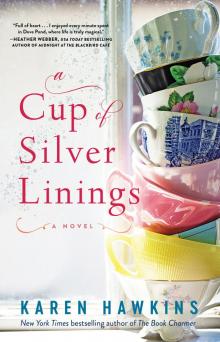 A Cup of Silver Linings
A Cup of Silver Linings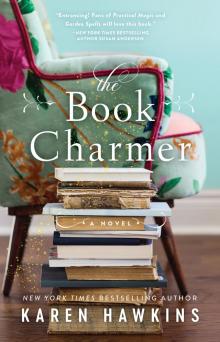 The Book Charmer
The Book Charmer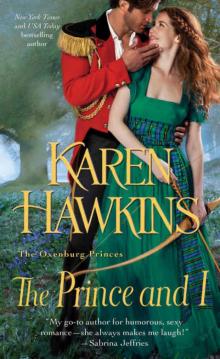 The Prince and I
The Prince and I![Duchess Diaries [2] How to Pursue a Princess Read online](http://i1.bookreadfree.com/i/03/12/duchess_diaries_[2]_how_to_pursue_a_princess_preview.jpg) Duchess Diaries [2] How to Pursue a Princess
Duchess Diaries [2] How to Pursue a Princess To Scotland, With Love
To Scotland, With Love Her Master and Commander
Her Master and Commander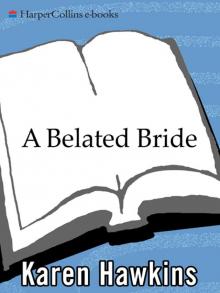 A Belated Bride
A Belated Bride 1794_Charlotte
1794_Charlotte The Abduction of Julia
The Abduction of Julia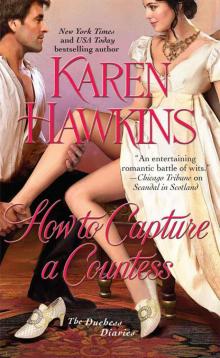 How to Capture a Countess (Duchess Diaries 1)
How to Capture a Countess (Duchess Diaries 1)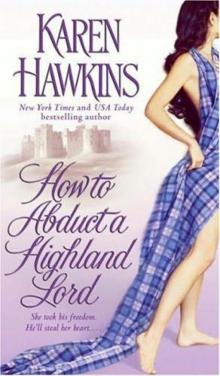 Karen Hawkins - MacLean 1 How to Abduct a Highland Lord
Karen Hawkins - MacLean 1 How to Abduct a Highland Lord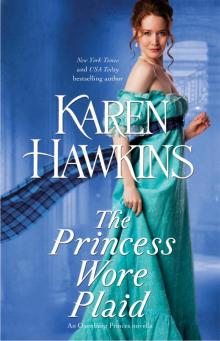 The Princess Wore Plaid
The Princess Wore Plaid How to Abduct a Highland Lord
How to Abduct a Highland Lord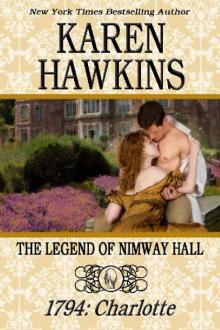 THE LEGEND OF NIMWAY HALL: 1794 - CHARLOTTE
THE LEGEND OF NIMWAY HALL: 1794 - CHARLOTTE Caught by the Scot
Caught by the Scot The Lady in the Tower
The Lady in the Tower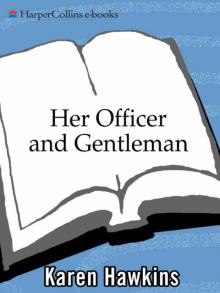 Her Officer and Gentleman
Her Officer and Gentleman Hurst 02 - Scandal in Scotland
Hurst 02 - Scandal in Scotland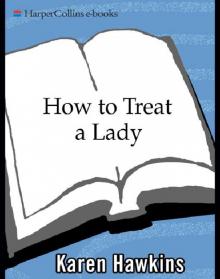 How to Treat a Lady
How to Treat a Lady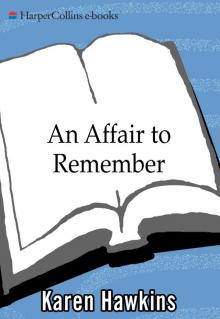 An Affair to Remember
An Affair to Remember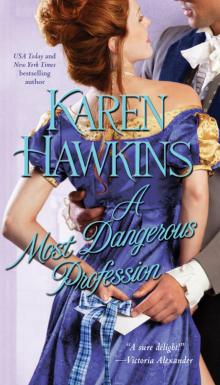 A Most Dangerous Profession
A Most Dangerous Profession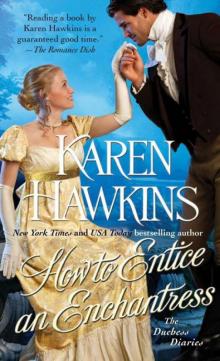 How to Entice an Enchantress
How to Entice an Enchantress The MacLeans: Sleepless in Scotland
The MacLeans: Sleepless in Scotland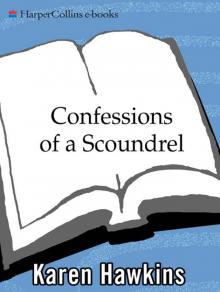 Confessions of a Scoundrel
Confessions of a Scoundrel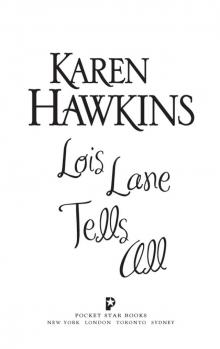 Lois Lane Tells All
Lois Lane Tells All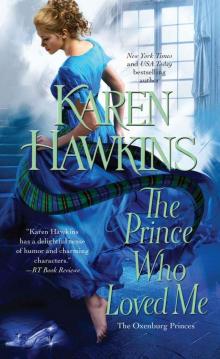 The Prince Who Loved Me (The Oxenburg Princes)
The Prince Who Loved Me (The Oxenburg Princes) The Seduction of Sara
The Seduction of Sara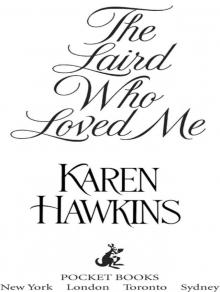 The Laird Who Loved Me
The Laird Who Loved Me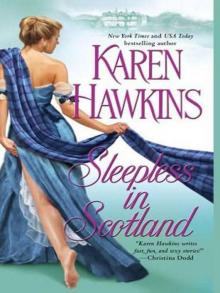 The MacLeans - Sleepless in Scotla
The MacLeans - Sleepless in Scotla And the Bride Wore Plaid
And the Bride Wore Plaid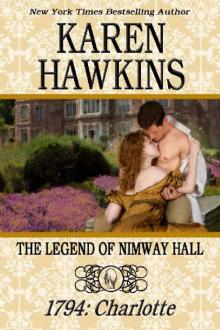 THE LEGEND OF NIMWAY HALL_1794_CHARLOTTE
THE LEGEND OF NIMWAY HALL_1794_CHARLOTTE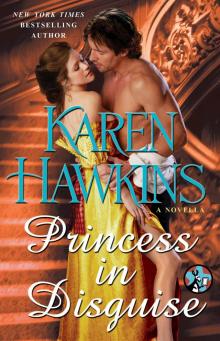 Princess in Disguise
Princess in Disguise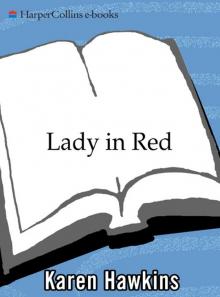 Lady in Red
Lady in Red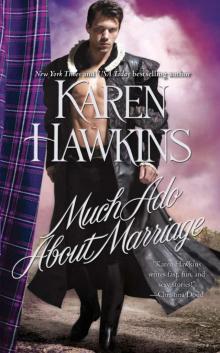 Much Ado About Marriage
Much Ado About Marriage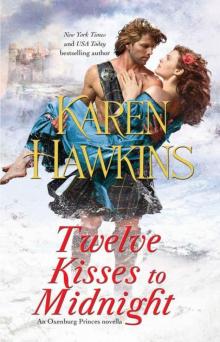 Twelve Kisses to Midnight: A Novella (The Oxenburg Princes)
Twelve Kisses to Midnight: A Novella (The Oxenburg Princes)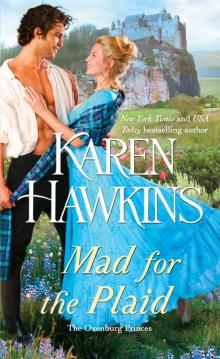 Mad for the Plaid
Mad for the Plaid An Encounter at Hyde Park
An Encounter at Hyde Park